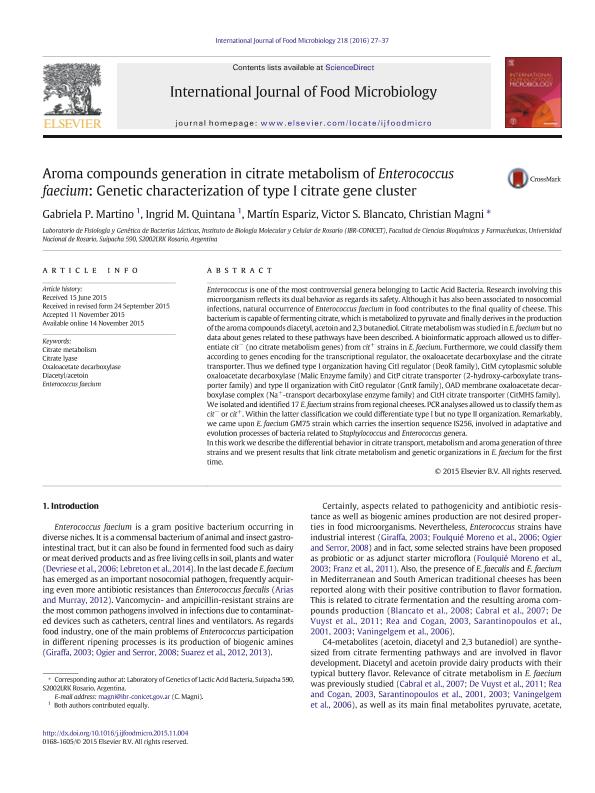Artículo
Aroma compounds generation in citrate metabolism of Enterococcus faecium: Genetic characterization of type I citrate gene cluster
Martino, Gabriela Paula ; Quintana, Ingrid María
; Quintana, Ingrid María ; Espariz, Martin
; Espariz, Martin ; Blancato, Victor Sebastian
; Blancato, Victor Sebastian ; Magni, Christian
; Magni, Christian
 ; Quintana, Ingrid María
; Quintana, Ingrid María ; Espariz, Martin
; Espariz, Martin ; Blancato, Victor Sebastian
; Blancato, Victor Sebastian ; Magni, Christian
; Magni, Christian
Fecha de publicación:
02/2016
Editorial:
Elsevier Science
Revista:
International Journal of Food Microbiology
ISSN:
0168-1605
Idioma:
Inglés
Tipo de recurso:
Artículo publicado
Clasificación temática:
Resumen
Enterococcus is one of the most controversial genera belonging to Lactic Acid Bacteria. Research involving this microorganism reflects its dual behavior as regards its safety. Although it has also been associated to nosocomial infections, natural occurrence of Enterococcus faecium in food contributes to the final quality of cheese. This bacterium is capable of fermenting citrate, which is metabolized to pyruvate and finally derives in the production of the aroma compounds diacetyl, acetoin and 2,3 butanediol. Citrate metabolism was studied in E. faecium but no data about genes related to these pathways have been described. A bioinformatic approach allowed us to differentiate cit- (no citrate metabolism genes) from cit+ strains in E. faecium. Furthermore, we could classify them according to genes encoding for the transcriptional regulator, the oxaloacetate decarboxylase and the citrate transporter. Thus we defined type I organization having CitI regulator (DeoR family), CitM cytoplasmic soluble oxaloacetate decarboxylase (Malic Enzyme family) and CitP citrate transporter (2-hydroxy-carboxylate transporter family) and type II organization with CitO regulator (GntR family), OAD membrane oxaloacetate decarboxylase complex (Na+-transport decarboxylase enzyme family) and CitH citrate transporter (CitMHS family).We isolated and identified 17 E. faecium strains from regional cheeses. PCR analyses allowed us to classify them as cit- or cit+. Within the latter classification we could differentiate type I but no type II organization. Remarkably, we came upon E. faecium GM75 strain which carries the insertion sequence IS256, involved in adaptative and evolution processes of bacteria related to Staphylococcus and Enterococcus genera. In this work we describe the differential behavior in citrate transport, metabolism and aroma generation of three strains and we present results that link citrate metabolism and genetic organizations in E. faecium for the first time.
Archivos asociados
Licencia
Identificadores
Colecciones
Articulos(IBR)
Articulos de INST.DE BIOLOGIA MOLECULAR Y CELULAR DE ROSARIO
Articulos de INST.DE BIOLOGIA MOLECULAR Y CELULAR DE ROSARIO
Citación
Martino, Gabriela Paula; Quintana, Ingrid María; Espariz, Martin; Blancato, Victor Sebastian; Magni, Christian; Aroma compounds generation in citrate metabolism of Enterococcus faecium: Genetic characterization of type I citrate gene cluster; Elsevier Science; International Journal of Food Microbiology; 218; 2-2016; 27-37
Compartir
Altmétricas



